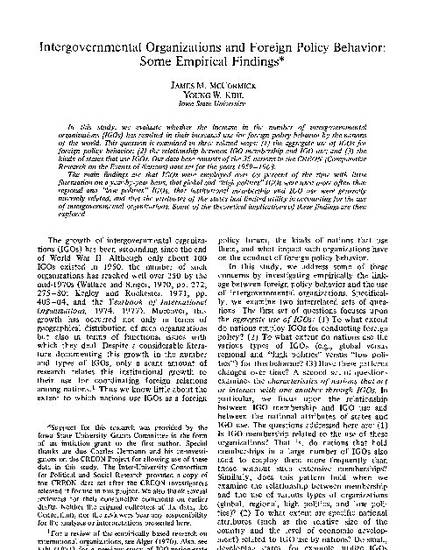
Article
Intergovernmental Organizations and Foreign Policy Behavior: Some Empirical Findings
The American Political Science Association
Document Type
Article
Disciplines
Publication Version
Published Version
Publication Date
1-1-1979
DOI
10.2307/1954893
Abstract
In this study, we evaluate whether the increase in the number of intergovernmental organizations (IGOs) has resulted in their increased use for foreign policy behavior by the nations of the world. This question is examined in three related ways: (1) the aggregate use of IGOs for foreign policy behavior; (2) the relationship between IGO membership and IGO use; and (3) the kinds of states that use IGOs. Our data base consists of the 35 nations in the CREON (Comparative Research on the Events of Nations) data set for the years 1959-1968.
The main findings are that IGOs were employed over 60 percent of the time with little fluctuation on a year-by-year basis, that global and "high politics" IGOs were used more often than regional and "low politics" IGOs, that institutional membership and IGO use were generally inversely related, and that the attributes of the states had limited utility in accounting for the use of intergovernmental organizations. Some of the theoretical implications of these findings are then explored.
Copyright Owner
American Political Science Association
Copyright Date
1979
Language
en
File Format
application/pdf
Citation Information
James M. McCormick and Young W. Khil. "Intergovernmental Organizations and Foreign Policy Behavior: Some Empirical Findings" The American Political Science Association Vol. 73 Iss. 2 (1979) p. 494 - 504 Available at: http://works.bepress.com/james-mccormick/9/

This is an article from The American Political Science Review 73 (1979): 494, doi:10.2307/1954893. Posted with permission.